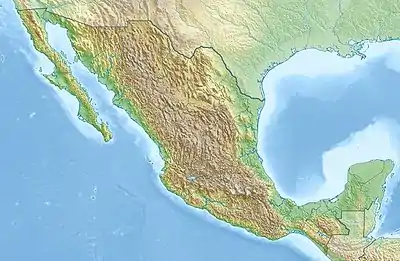| Laredo Formation | |
|---|---|
| Stratigraphic range: Lutetian (Uintan) ~ | |
| Type | Formation |
| Unit of | Claiborne Group |
| Lithology | |
| Primary | Sandstone |
| Other | Shale, limestone |
| Location | |
| Coordinates | 26°24′N 99°12′W / 26.4°N 99.2°W |
| Approximate paleocoordinates | 28°24′N 89°36′W / 28.4°N 89.6°W |
| Region | Texas Nuevo León, Tamaulipas |
| Country | |
 Laredo Formation (Mexico) | |
The Laredo Formation is a geologic formation and Lagerstätte[1] in Texas, United States, and Nuevo León and Tamaulipas, Mexico. It preserves fossils dating back to the Lutetian stage of the Eocene period.[2] Among many other fossils, the formation has provided invertebrates, vertebrates, leaves, pollen and spores and fossil wood of the brackish water palm Nypa sp.[1]
See also
References
- 1 2 Garten & Gee, in Reitner et al., 2013, p.57
- ↑ Laredo Formation at Fossilworks.org
Bibliography
- Reitner, Joachim; Yang Qun; Wang Yongdong, and Mike Reich. 2013. Palaeobiology and Geobiology of Fossil Lagerstätten through Earth History, 1-218. Universitätsverlag Göttingen. Accessed 2020-09-15. ISBN 978-3-86395-135-1
This article is issued from Wikipedia. The text is licensed under Creative Commons - Attribution - Sharealike. Additional terms may apply for the media files.